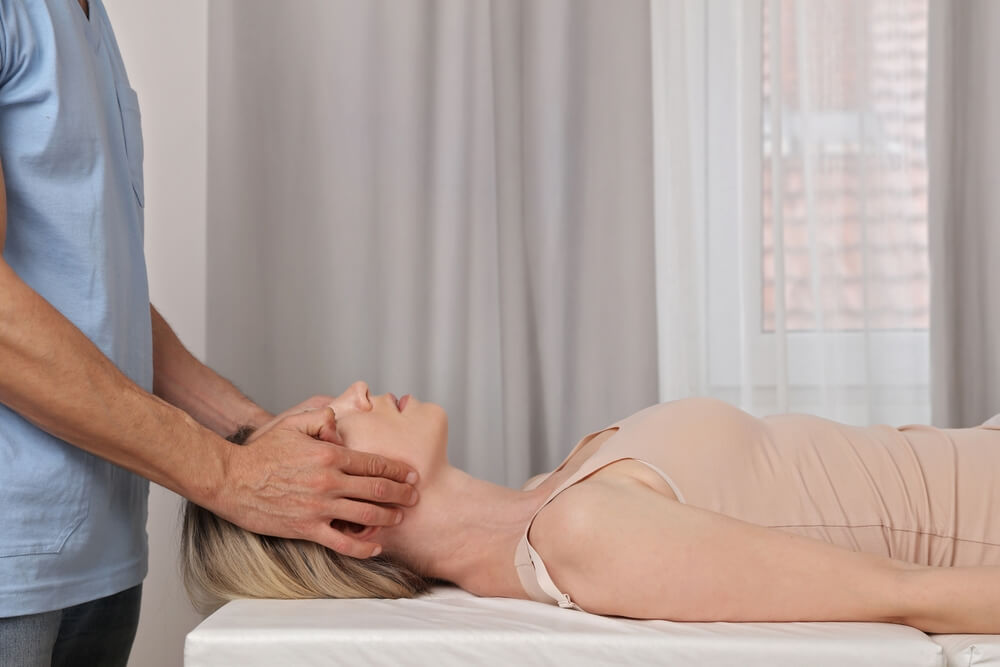Chiro for TMJ Disorder


During a jaw adjustment, the chiropractor will use their hands to apply a gentle, controlled force to the jaw joint to improve its alignment and movement. This can help to reduce pain, improve range of motion, and alleviate other symptoms associated with TMJ disorders.
It’s worth noting that many TMJ presentations are due to clenching or grinding, which is associated with a stress response. This is important as Chiropractors are trained to diagnose and treat the cause of the problem and if stress is the main cause, then this obviously needs to be addressed and your Chiropractor has many ways to treat these stress related responses.
Symptoms of TMJ
Symptons can vary, but you may experience:
- Pain or tenderness in the jaw joint or surrounding muscles
- Clicking, popping, or grating sounds when opening or closing the mouth
- Difficulty or discomfort when opening or closing the mouth
- Headaches or earaches
- Jaw locking or getting stuck in an open or closed position
- Swelling on the side of the face
- Changes in the way the upper and lower teeth fit together
- Pain or sensitivity in the teeth
- Dizziness or ringing in the ears
- Grinding or clenching
What causes TMJ problems?

There are several factors that can contribute to TMJ dysfunction. These include:
- Trauma or injury to the jaw joint or muscles
- Grinding or clenching of the teeth, which puts pressure on the jaw joint and surrounding muscles
- Arthritis, which can affect the joint and cause inflammation and pain
- Misaligned bite, which can put stress on the jaw joint and muscles
- Stress, which can cause tension in the muscles around the jaw joint and lead to pain and discomfort


TMJ treatment with chiropractic care

In the case of TMJ dysfunction, chiropractors may use techniques to adjust the jaw joint itself, as well as the neck and upper back, which can also be contributing factors to TMJ pain.
Cranial therapy is a type of chiropractic treatment that focuses on the bones of the skull, face, and mouth, and how they relate to the overall health of the body. All Chiropractors at Karrinyup Wellness Centre have extensive training and knowledge in cranial therapy.
The theory behind cranial therapy is that the bones of the skull are not fixed, but instead have small amounts of movement that can become restricted due to injury, stress, or other factors. This can lead to tension and pain in the head and face, which can contribute to TMJ symptoms.
During a cranial therapy session, the chiropractor will use gentle, non-invasive techniques to gently adjust the bones of the skull and face, with the goal of restoring their proper movement and alignment. This may involve placing their hands on various points of the skull and face, or using light pressure to adjust the bones.
TMJ prevention and management

There are several ways to prevent and manage TMJ symptoms:
- Regular chiropractic treatment.
- Avoid grinding or clenching your teeth: This can put excess pressure on the jaw joint and muscles, leading to TMJ symptoms.
- Practice relaxation techniques: Stress and anxiety can contribute to TMJ symptoms, so practicing relaxation techniques such as deep breathing, meditation, or yoga can help manage stress levels and reduce TMJ symptoms.
- Avoid hard or chewy foods: Foods that require a lot of chewing can put extra strain on the jaw joint and muscles, leading to TMJ symptoms. Stick to soft, easy-to-chew foods when possible.
- Apply heat or ice: Applying heat or ice to the affected area can help relieve pain and reduce inflammation. You can try using a warm compress or taking a warm shower, or applying a cold pack wrapped in a towel.
- Exercise: Certain exercises can help strengthen the muscles in the jaw and improve jaw movement, reducing TMJ symptoms.
- Practice good oral hygiene: Keeping your teeth and gums healthy can help prevent TMJ caused by dental issues, such as cavities or gum disease.
Effective TMJ chiro treatment with Karrinyup Wellness Centre
If you’re suffering from ongoing TMJ problems, call the Karrinyup Wellness centre to find out how a chiropractic treatment plan could reduce your symptoms associated with TMJ.

Other conditions that can be treated with chiropractic adjustments:
- Headaches
- Migraines
- Arthritic conditions
- Neck Pain
- Sciatica
- Back injuries
- Lower back pain
- Chronic Pain
- Sport Injuries
- Wrist, elbow and shoulder pain
- Foot, knee and hip problems
- Muscle Spasms and injuries
- Dizziness and vertigo
- Numbness, pins and needles
- TMJ Disorders
- Postural problems
- Whiplash
- Plantar fasciitis
- Stiffness
- Carpal tunnel
- Sports performance
- Decreased range of motion
Get in Touch
With Us
Whether you are a new client to us and have questions, or an existing client needing to re-book, the process is easy!
Call or email us today! We are here to help.




